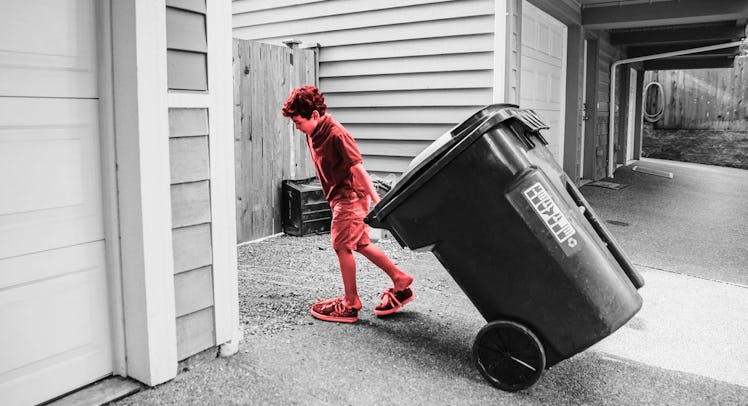How to Know What Age To Give Your Kid Certain Chores
It's science.

Parents looking for ideas of chores for kids will often seek out chore charts for age-appropriate chores. One such chore chart for children was developed by Maria Montessori who founded her first school in Tarrytown, NY in 1911. It’s not just her namesake style of alternative schooling that makes her chore chart so popular. What’s most startling is that the chart suggests that age-appropriate chores, in fact, start much sooner than most parents realize. But should 2-year-olds really be setting the table? Should 4-year-olds be vacuuming, 6-year-olds weeding the garden and 10-year-olds mowing the lawn? The answer, as is the case for so much in parenting, is that it depends on your kid.
“Every kid is different. Every relationship in every family dynamic is different,” explains positive psychologist Dr. Robert Zeitlin, author of Laugh More, Yell Less: A Guide to Raising Kick-Ass Kids. “So the idea that a 2-year-old child should be doing something specific, in my opinion, is a generalization which isn’t useful to a parent.”
Zeitlin notes that parents are the best ones to decide if children are ready for certain chores based on their child’s developmental progress. A decision to have a 2-year-old kid carry firewood should not be made arbitrarily, particularly if that child isn’t particularly strong or coordinated. “You know your kid,” he notes. “You know where they are developmentally you know what’s appropriate to ask of them.”
That doesn’t mean that parents can’t challenge their children if they want a kid who isn’t ready for a task to step up. It simply means that parents need to offer a bit more guidance and help prepare a kid for the larger task. In order to do that Zeitlin recommends parents take the bigger task and break it down into constituent parts. This creates a path towards the whole task. A child might not be ready to load and run the dishwasher, but they might be able to put a bowl in or add the detergent. As they become more capable they can take on even more of the task, like unloading and putting away dishes.
As an educational philosophy, it extends beyond the school, and suggests that household chores are perfect for the sort of goal setting and task mastering that raises self esteem while simultaneously teaching important life skills. Also not new: parents who feel inadequate in the face of the more-than-slightly idealized version of kids that Montessori sometimes seems based on.
That’s not to say that the famous Montessori chore chart should be disregarded. As an educational philosophy, Montessori extends beyond the school and suggests that household chores are perfect for the sort of goal setting and task mastering that raises self-esteem while teaching important life skills. And for what it’s worth, research is on Montessori’s side when it comes to chores. They are in fact correlated with future success. PLus when they are unpaid, they help a child learn about the value of helping others.
But Zeitlin suggests that there’s no need to go all in on any particular chore chart for kids. Even worse is the idea of feeling bad your kid isn’t developmentally able to tackle a task laid out by Montessori. “If parents haven’t considered some of the chores that are on there, it’s good for research,” he says. “I don’t think it’s something they need to cling to. I think it’s something to use as raw material to create their own chore chart that syncs with their own values.”
In other words, pick up a chore chart template and fill it out with chores that reflect what’s important to your own family. There is a greater chance the chores will be appropriate for your kid, completed and beneficial for everyone involved — just the way Montessori would have wanted.